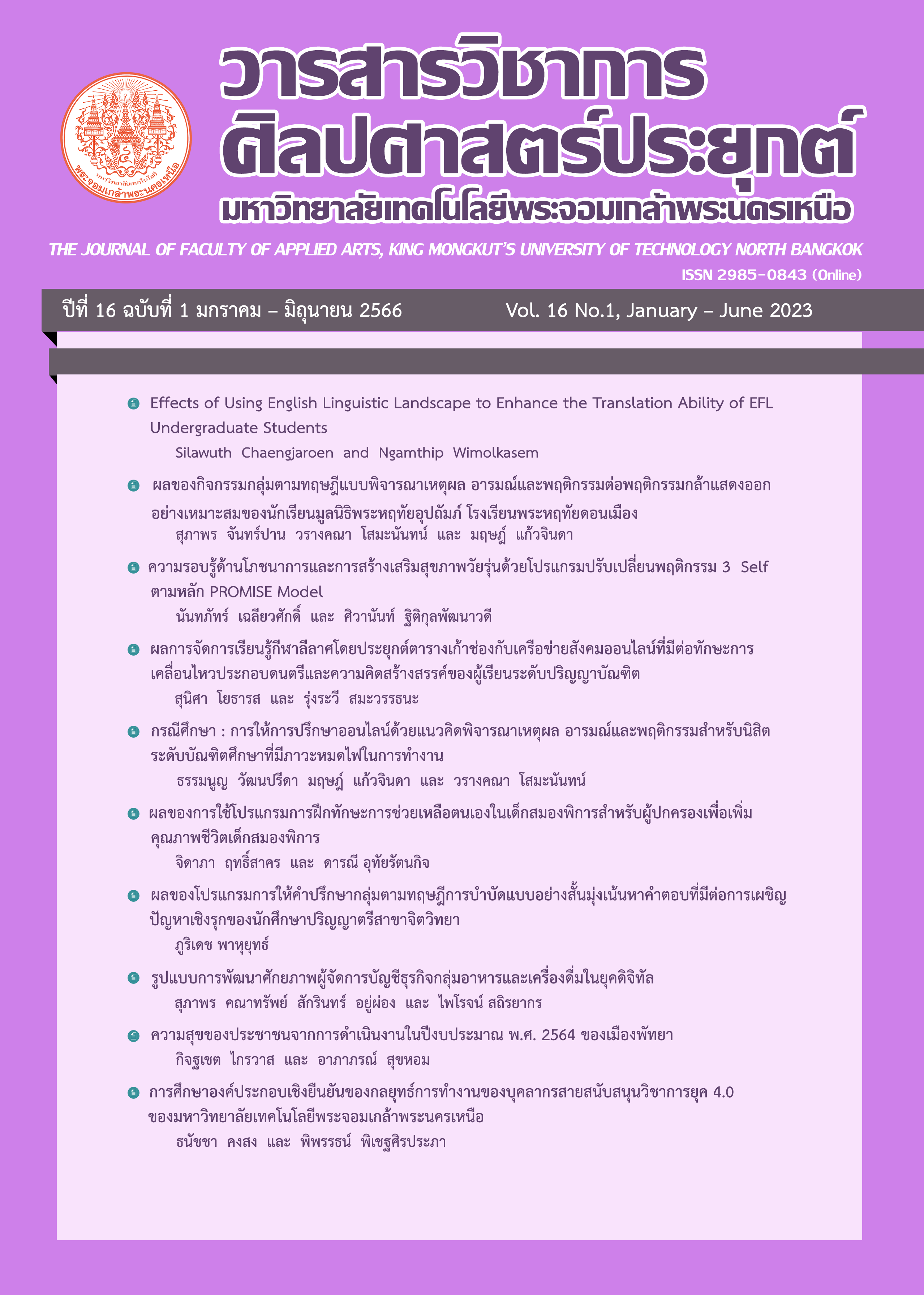ผลของโปรแกรมการให้คำปรึกษากลุ่มตามทฤษฎีการบำบัดแบบอย่างสั้น มุ่งเน้นหาคำตอบที่มีต่อการเผชิญปัญหาเชิงรุกของนักศึกษาปริญญาตรีสาขาจิตวิทยา
Main Article Content
บทคัดย่อ
การวิจัยครั้งนี้มีวัตถุประสงค์ 1) เพื่อศึกษาระดับพฤติกรรมการเผชิญปัญหาเชิงรุกของนักศึกษาจิตวิทยา 2) เพื่อสร้างโปรแกรมการให้คำปรึกษากลุ่มตามทฤษฎีการบำบัดแบบอย่างสั้นมุ่งเน้นหาคำตอบเพื่อเสริมสร้างการเผชิญปัญหาเชิงรุกของนักศึกษาจิตวิทยา และ 3) เพื่อศึกษาผลของโปรแกรมการให้คำปรึกษากลุ่มตามทฤษฎีการบำบัดแบบอย่างสั้นมุ่งเน้นหาคำตอบเพื่อเสริมสร้างการเผชิญปัญหาเชิงรุกของนักศึกษาจิตวิทยา กลุ่มตัวอย่างในการวิจัยแบ่งออกเป็น 2 ระยะ ได้แก่ 1) กลุ่มตัวอย่างในการวิจัยเชิงปริมาณ นักศึกษาจิตวิทยาจำนวน 317 คน คัดเลือกกลุ่มตัวอย่างโดยการสุ่มแบบชั้นภูมิตามสัดส่วนชั้นปีและสาขา 2) กลุ่มตัวอย่างในการวิจัยเชิงทดลอง จำนวน 16 คน โดยเลือกกลุ่มตัวอย่างแบบเจาะจงมีค่าเฉลี่ยการเผชิญปัญหาเชิงรุกเปอร์เซนไทล์ที่ 25 ลงมา และมีความสมัครใจที่เข้าร่วมการทดลอง และใช้การสุ่มอย่างง่ายเป็นกลุ่มทดลอง 8 คน และกลุ่มควบคุม 8 คน เครื่องมือที่ใช้ในการวิจัย ได้แก่ แบบวัดการเผชิญปัญหาเชิงรุก จำนวน 44 ข้อ มีค่าความเชื่อมั่นที่ .915 และโปรแกรมการให้คำปรึกษากลุ่มตามทฤษฎีการบำบัดแบบอย่างสั้นมุ่งเน้นหาคำตอบเพื่อเสริมสร้างการเผชิญปัญหา เชิงรุกของนักศึกษาจิตวิทยา จำนวน 8 ครั้ง สถิติที่ใช้ในการวิเคราะห์ข้อมูลคือ ค่าร้อยละ ค่าเฉลี่ย ค่าเบี่ยงเบนมาตรฐาน การทดสอบสมมติฐาน Wilcoxon signed-rank test และ Mann – Whitney U test ผลการวิจัยพบว่า 1) การเผชิญปัญหาเชิงรุกของนักศึกษาจิตวิทยาอยู่ในระดับสูง มีค่าเฉลี่ย 4.06 และส่วนเบี่ยงเบนมาตรฐาน .441 2) โปรแกรมการให้คำปรึกษากลุ่มตามทฤษฎีการบำบัดแบบอย่างสั้นมุ่งเน้นหาคำตอบเพื่อเสริมสร้างการเผชิญปัญหาเชิงรุกของนักศึกษาจิตวิทยา ประกอบด้วย 3 ขั้นตอน ได้แก่ ขั้นเริ่มต้นการให้คำปรึกษากลุ่ม ขั้นดำเนินการ และขั้นยุติการให้คำปรึกษากลุ่ม 3) การเผชิญปัญหาเชิงรุกของกลุ่มทดลองที่ได้รับการให้คำปรึกษากลุ่ม (SFBT) มีการเผชิญปัญหาเชิงรุกหลังการทดลองและระยะติดตามผล สูงขึ้นกว่าก่อนการทดลองอย่างมีนัยสำคัญทางสถิติที่ระดับ .05 และกลุ่มทดลองที่ได้รับการให้คำปรึกษากลุ่ม (SFBT) มีการเผชิญปัญหาเชิงรุก หลังการทดลอง และระยะติดตามผลสูงกว่ากลุ่มควบคุม อย่างมีนัยสำคัญทางสถิติที่ระดับ .05
Article Details

อนุญาตภายใต้เงื่อนไข Creative Commons Attribution-NonCommercial-NoDerivatives 4.0 International License.
1.บทความที่ตีพิมพ์เป็นลิขสิทธิ์ของวารสารวิชาการศิลปศาสตร์ประยุกต์ การนำเนื้อหา ข้อความหรือข้อคิดเห็น รูปภาพ ตาราง ของบทความไปจัดพิมพ์เผยแพร่ในรูปแบบ ต่าง ๆ เพื่อใช้ประโยชน์ในเชิงพาณิชย์ ต้องได้รับอนุญาตจากกองบรรณาธิการวารสารอย่างเป็นลายลักษณ์อักษร
2.ข้อความที่ปรากฏในบทความแต่ละเรื่อง เป็นความคิดเห็นส่วนตัวของผู้เขียนแต่ละท่านไม่เกี่ยวข้องกับวารสารวิชาการศิลปศาสตร์ประยุกต์ และบุคลากร คณาจารย์ท่านอื่น ๆ ในวารสารฯ แต่อย่างใด ความรับผิดชอบองค์ประกอบทั้งหมดของบทความแต่ละเรื่องเป็นของผู้เขียนแต่ละท่าน หากมีความผิดพลาดใด ๆ ผู้เขียนแต่ละท่านจะรับผิดชอบบทความของตนเองแต่ผู้เดียว
เอกสารอ้างอิง
ภาษาไทย
กุลวณิ ชุ่มฤทัย. (2561). ผลการปรึกษากลุ่มตามทฤษฎีการปรึกษาแบบเน้นทางออกระยะสั้นต่อการแก้ปัญหาเชิงสังคมของนิสิตชั้นปีที่1. วิทยาศาสตรมหาบัณฑิต, มหาวิทยาลัยบูรพา.
คมเพชร ฉัตรศุภกุล. (2558). คุณลักษณะของผู้ให้คำปรึกษากลุ่มทางจิตวิทยา Characteristics of Psychological Group
Counselor. วารสารวิชาการ มหาวิทยาลัยราชภัฏบุรีรัมย์ สาขามนุษย์ศาสตร์และสังคมศาสตร์, 7(1), 25-38.
ดวงมณี จงรักษ์. (2561). การใช้ 4 ทฤษฎีการปรึกษาในการปรึกษากลุ่ม. วารสารวิทยบริการ มหาวิทยาลัยสงขลานครินทร์, 29(1), 188-200.
บุญทริกา เอี่ยมคงศร ผ่องพรรณ เกิดพิทักษ์ และประสาร มาลากุล ณ อยุธยา. (2561). การพัฒนารูปแบบการให้การปรึกษากลุ่มการรู้คิดพฤติกรรมเพื่อเสริมสร้างการเผชิญปัญหาเชิงรุกของวัยรุ่นตั้งครรภ์ไม่พร้อม. วารสารพยาบาลตำรวจ, 10(2), 308-318.
บุญชม ศรีสะอาด. (2553). การวิจัยเบื้องต้น (พิมพ์ครั้งที่ 8). กรุงเทพมหานคร: สุวีริยาสาส์น
ธงชัย สมบูรณ์. (2551). อัตลักษณ์ “เด็กราม” รายงานการวิจัยสถาบันวิจัยและพัฒนา มหาวิทยาลัยรามคำแหง. กรุงเทพมหานคร: มหาวิทยาลัยรามคำแหง.
ศุภมาส หวานสนิท. (2559). ผลของการปรึกษากลุ่มตามทฤษฎีเน้นทางออกระยะสั้นต่อความสามารถในการแก้ปัญหาของนิสิตมหาวิทยาลัยบูรพา. วิทยาศาสตรมหาบัณฑิต, มหาวิทยาลัยบูรพา.
สุรางค์ โค้วตระกูล. (2554). จิตวิทยาการศึกษา. (พิมพ์ครั้งที่10). กรุงเทพมหานคร: จุฬาลงกรณ์มหาวิทยาลัย.
สุขอรุณ วงษ์ทิม. (2554). แนวคิดทางการแนะแนวและทฤษฎีการปรึกษาเชิงจิตวิทยา. หน่วยที่ 1-14. นนทบุรี: มหาวิทยาลัยสุโขทัยธรรมมาธิราช.
วิจิตรพาณี เจริญขวัญ. (2560). ระบบและทฤษฎีทางจิตวิทยา. กรุงเทพมหานคร: สำนักพิมพ์มหาวิทยาลัยรามคำแหง.
วิภาพร ตัณฑสวัสดิ์. (2564). การวิเคราะห์ทักษะของนักจิตวิทยาในศตวรรษที่ 21 ที่จำแนกภาวะการมีงานทำที่เกี่ยวข้องและไม่เกี่ยวข้องกับจิตวิทยาของบัณฑิตสาขาวิชาจิตวิทยา มหาวิทยาลัยราชภัฏไลยอลงกรณ์ ในพระบรมราชูปถัมภ์.
วารสารจิตวิทยาคลินิกไทย. 52(2), 74-86.
ผ่องพรรณ เกิดพิทักษ์. (2554). สาระสำคัญของการให้การปรึกษา. วารสารจิตวิทยา มหาวิทยาลัยเกษมบัณฑิต, 1(1), 128-145.
อุบลรัตน์ เพ็งสถิตย์. (2562). จิตวิทยาพัฒนาการวัยเด็ก. กรุงเทพมหานคร: สำนักพิมพ์มหาวิทยาลัยรามคำแหง.
ภาษาอังกฤษ
Aspinwall, L.G., & Taylor, S.E. (1997). A Stitch in Time: Self-regulation and Proactive Coping. Psychological Bulletin. 121, 417-436.
Bakalım, O., & Taşdelen Karçkay, A. (2017). Effect of Group Counseling on Happiness, Life Satisfaction and Positive-Negative Affect: A Mixed Method Study. Journal of Human Sciences, 14(1), 624–632. Retrieved from https://j-humansciences.com/ojs/index.php/IJHS/article/view/4377
Bien, T. H., Miller, W. R., & Tonigan, J. S. (1993). Brief Interventions for Alcohol Problems: A review. Addiction, 88(3), 315–335. Retrieved from https://doi.org/10.1111/j.1360-0443.1993.tb00820.x
Erden, S. (2015). Awareness: The Effect of Group Counseling on Awareness and Acceptance of Self and Others. Procedia - Social and Behavioral Sciences, 174, 1465 – 1473.
Corey, G., (2009a). Theory of Counseling and Psychotherapy. (8th ed.). California: Thomson Brooks/Cole.
Corey, G., (2012b). Theory and Practice of Group Counseling. (8th ed.). California: Thomson Brooks/Cole.
Folkman, S., & Lazarus, R. S. (1980). An Analysis of Coping in A Middle-Aged Community Sample. Journal of Health and Social Behavior, 21(3), 219–239. Retrieved from https://doi.org/10.2307/2136617
Jacobs, E., Masson, R.; & Harvill, R. (2009). Group Counseling. California: Thomson Brooks/Cole.
Kim, J.S. (2006). Examining the Effectiveness of Solution-Focused Brief Therapy: A Meta-Analysis. Research on Social Work Practice, 18, 107 - 116.
Krejcie, R. V., & Morgan, D. W. (1970). Determining Sample Size for Research Activities. Educational and Psychological Measurement, 30(3), 607-610.
Folkman, S. (1997). Positive Psychological States and Coping with Severe Stress. Social Science & Medicine, 45(8), 1207–1221. Retrieved from https://doi.org/10.1016/S0277-9536(97)00040-3
Folkman, S., & Lazarus, R. S. (1980). An Analysis of Coping in A Middle-Aged Community Sample. Journal of Health and Social Behavior, 21(3), 219–239. Retrieved from https://doi.org/10.2307/2136617
Frydenberg, E. (2008). Adolescent Coping Advances in Theory, Research and Practice. New York: Routledge.
Gladding, S. T. (2013). Counseling: A Comprehensive Profession. (7th. Eds.). USA: Pe Retrieved from arson Education, Inc.
Gingerich, W. J., & Eisengart, S. (2000). Solution-Focused Brief Therapy: A Review of the Outcome Research. Family Process, 39(4), 477-489.
Greenglass, E., Schwarzer, R., Jakubiec, D., Fiksenbaum, L., & Taubert, S. (1999). The Proactive Coping Inventory (PCI): A Multidimensional Research Instrument. Paper presented at the 20th International Conference of the Stress and Anxiety Research Society, Cracow, Poland, July 12–14.
Greenglass, E., & Frydenberg, Erica. (2002). Beyond Coping: Meeting Goals, Visions, and Challenges. pp. 37-62. London: Oxford University Press.
Haggis, T. (2003) Constructing Images of Ourselves? A Critical Investigation into Approaches to Learning. Research in Higher Education British Educational Research Journal, 29, 89-104.
Mayer, Re. (1983). Thinking problem solving. Cognition: WH Freeman.
Rowell, L., & Hong, E. (2013). Academic motivation: Concepts, strategies, and counseling approaches. Professional School Counseling, 16(3), 158–171. Retrieved from https://doi.org/10.5330/PSC.n.2013-16.158
Seligman, M. E. P., & Csikszentmihalyi, M. (2000). Positive psychology: An Introduction. In Special Issue on Happiness, Excellence, and Optimal Human Functioning. American Psychologist, 55, 5-14.
Sharf, Richard S. (2012). Theories of Psychotherapy & Counseling: Concept and Cases. 2nd ed. California: Brooks/Cole
Schwarzer, R. (1999). Self-Regulatory Processes in the Adoption and Maintenance of Health Behaviors: The role of optimism, goals, and threats. Journal of Health Psychology, 4 ,115 -127.
Schwarzer, R., & Knoll, N. (2007). Positive Coping: Mastering Demands and Searching for Meaning. In Handbook of Positive Psychological Assessment (eds.)
Schwarzer, R., & Taubert, S. (2002). Tenacious Goal Pursuits and Striving toward Personal Growth: Proactive Coping. In E. Frydenberg (Ed.), Beyond Coping: Meeting Goals, Visions and Challenges.
-35. London: Oxford University Press.
Viktorija, C., & Rytis, P. (2011). Outcome of Solution-Focused Self-Reflection for Personal Growth. Vytautas Magnus University, Lithuania. International Journal of Psychology: A Biopsychosocial Approach, 9, 133-150.
Walter, J. L., & Peller, J. E. (2000). Recreating brief therapy: Preferences and possibilities. W.W. Norton & Co.


